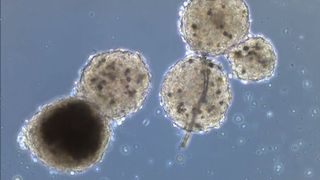Scientists have 3D-printed heart and liver 'organoids' that could save your life
The teeny organs work exactly like the real thing

A team attempting to recreate an entire human body on a chip has scored its first major success - building miniature 3D-printed versions of the heart and liver.
Anthony Atala and a group at the Wake Forest Institute for Regenerative Medicine in Winston-Salem, North Carolina created a cluster of tiny hearts by reprogramming skin cells into heart cells. The "organoids", as the team calls them, were then given a size and shape by a 3D printer fed with cell culture.
The resulting hearts measure about 0.25 millimetres in diameter - slightly wider than a strand of human hair. A liver, created using the same process, was also fused to the side of one of the hearts.
The team was funded to the tune of $24 million (£16m) in late 2013 by the US government. When the funding was announced, Atala said: "Miniature lab-engineered, organ-like hearts, lungs, livers and blood vessels - linked together with a circulating blood substitute - will be used both to predict the effects of chemical and biologic agents and to test the effectiveness of potential treatments."
The aim of replicating a human body on a chip is to create cheap systems that can test new treatments or the effects of diseases without resorting to animal testing - which is slow, costly, ethically controversial and not always the best analogue of the human body.
Via New Scientist
Get daily insight, inspiration and deals in your inbox
Get the hottest deals available in your inbox plus news, reviews, opinion, analysis and more from the TechRadar team.

